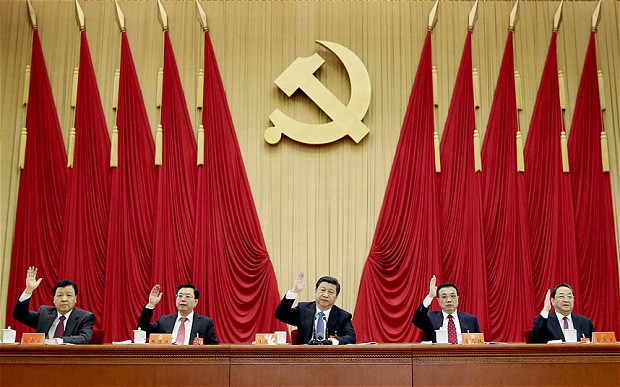[captionpix align=”right” theme=”elegant” width=”300″ imgsrc=”http://natoassociation.ca/wp-content/uploads/2013/11/xinping.jpg” captiontext=”General Secretary Xi Jinping, centre, at the Third Plenum of the Communist Party of China’s 18th Central Committee.”]
General Secretary Xi Jinping and his colleagues in the Central Committee of the Communist Party of China (CPC) took part in their third plenary meeting this month, from November 9th to 12th. Such meetings, or Plenums, have traditionally been an opportunity for China’s leaders to discuss the direction of long-term economic and social development. Official statements regarding the most recent closed-door summit suggest that Xi Jinping wants to introduce reforms to increase economic openness and improve social welfare in China over the next decade. Nonetheless, the vagueness and inconclusiveness of official reports have disappointed many observers, domestically and abroad.
Plenary sessions of China’s Central Committee have historically served to introduce periods of reform. For example, when then-Chairman Den Xiaoping hosted the Third Plenary Session of the CPC’s 11th Central Committee in 1978, he introduced sweeping reforms that introduced capitalism and modernized the Chinese economy. Further still, Zhu Rongji’s Third Plenum in 1993 led to the privatization of many state-owned enterprises which spurred dramatic economic growth. This year, statements released by the Communist Party suggest that the relationship between the Chinese government and the market remain a central subject of discussion. Many experts believe that the plenary session discussed plans to reduce the government’s role in the market and expand the private sector. It is alleged that these measures will help modernize China’s economy by reducing market inefficiencies.
It is interesting to note that a large part of China’s past economic success can be attributed to the government’s vast control over various sectors of the market. By deliberately devaluing the Chinese Yuan, for example, China’s manufacturing sector and exports gain an unfair advantage against that of other countries. As of July 2013, experts estimate that the Yuan is undervalued by up to 44%. However, this kind of centrally planned economy is not sustainable in the long term. A major issue that was discussed at this month’s Third Plenum was the nature of state-owned enterprises in particular. State owned firms with monopolies over industries such as telecommunications and energy incur large inefficiencies. Many of these firms have accumulated large amounts of debt and have failed to turn a profit for decades. However, because they are state-funded, they are immune to the market forces and competition that force most companies to improve.
Alleged social injustices in China were also addressed at this month’s Third Plenum, and China’s Hukuo system in particular. Under this system, Chinese citizens only have access to social services such as education from their home address. This places the children of millions of migrant workers at risk, because they are only entitled to social benefits in the provinces their families moved away from. Given that not all Chinese provinces have benefitted equally from economic growth, the interests of urban locals conflict with that of migrant workers. Powerful urban interest groups are pressuring the government to maintain the status quo. Unfortunately, commitment to reforming the Hukuo system was omitted in the official statement from the Third Plenum.
Although experts agree that regulatory changes are needed to address economic inefficiencies and social injustices in China, the best way to execute these policies remains unclear. China has one of the largest economies in the world and the Third Plenum is only the beginning of an inevitably long reformation process. For many, it is disappointing that official statements remain vague about how far these changes will go and how soon they will begin. The vagueness reveals that while CPC leaders recognize the current problems, competing interests from powerful interest groups remain a significant obstacle to change. However, if the current regime succeeds in their ambitious goals of economic and social reform, China will gain a more efficient market and equitable society. In this case, foreigners can expect more access to the Chinese markets as China transitions from a state-dominated economy to a market-oriented one.




